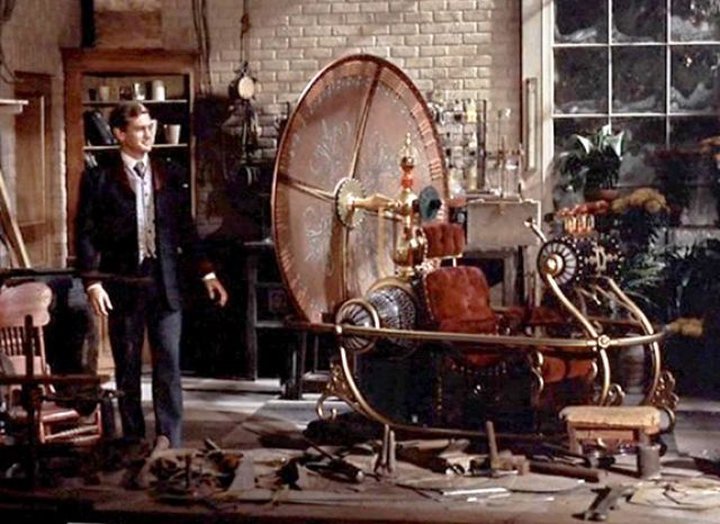“There’s no getting into the Future except by waiting. You can only sit down and see it come by.”
— Israel Zang, reviewing The Time Machine for Pall Mall Magazine, 1895
###
H.G. Wells didn’t think his fantasy The Time Machine, published in 1895, was that much of a literary feat. Years later, mocking his own creation, he wrote, “The effect of reality is easily produced. One jerks in one or two unexpected gadgets or so, and the trick is done.” But for late Victorian England, the novella—just 84 pages—was a thrilling entrée into a previously uncharted territory where time is a dimension. “There is no difference between Time and any of the three dimensions of Space except that our consciousness moves along it,” explains the unnamed Time Traveller (British spelling!) to his gormless friends.
Ten years before Einstein introduced special relativity to the world, Wells gave his readers the ability to travel seamlessly through time, via his titular machine, “Parts were of nickel, parts of ivory, parts had certainly been filed or sawn out of rock crystal.” It needed no more maintenance than a bicycle: “I gave it a last tap, tried all the screws again, put one more drop of oil on the quartz rod, and sat myself in the saddle.” (Wells, unsurprisingly, was an avid cyclist.)

Rod Taylor in the 1960 flick The Time Machine
One reason for the novelty of Wells plot—which, to be fair, he’d presaged a few years earlier with a less familiar time-yarn, The Chronic Argonauts (1888)—was that the world was still Newtonian. Time, per Isaac Newton, is fixed and immutable, distinct from space; time passes uniformly, here, there and everywhere. So Wells’ “trick” of bucking that, traveling faster than “one second per second,” was a wild and wonderful concept. By making time another dimension, akin to length, breath and height, he introduced a new genre of fiction that’s been the subject of innumerable literary and cinematic tropes ever since. None of which, if we’re being honest, make any more sense than Wells’ original! As Bruce Willis tells his former self Joseph Gordon-Levitt in Looper, “I don’t want to talk about time-travel shit, because if we start, we’re going to be here all day, making diagrams with straws.” (FWIW, I loved the movie, starring two of my favorite actors.)
Einstein really didn’t help much, either. Yeah, he got us away from space and time, giving us spacetime. But I’m not sure we’ve come much farther in our understanding of time since Saint Augustine wrote, some 1600 years ago, “What then is time? If no one asks me, I know. If I wish to explain it to one who asks, I know not.” What has changed in the 125 years since Wells published his story (for 100 pounds, a goodly sum at the time) is our understanding of time in relation to entropy. While we can move freely in any direction through space, we can only go forward in time, thanks to what’s usually called “time’s arrow.” Even if you figure out how to jump ahead in time, all the wormholes, stargates and time dilation tricks in the universe won’t take you back to an earlier state. Entropy (aka the Second Law of Thermodynamics) is unyielding, always increasing; things will only get more disordered. The egg will never unbreak, your café au lait will never resolve back into coffee and milk. Hence time’s arrow, from low entropy past to high entropy future. Which pretty much puts the kibosh on the time machine bringing the luckless Traveller back from the future, notwithstanding the ivory and rock crystal.
When I first read the story—I was probably 11 or 12—I lapped it up. The best part was the bleakest, as the Time Traveller, “drawn on by the mystery of Earth’s fate,” lands on a desolate beach some 30 million years in the future. “From the edge of the sea came a ripple and whisper. Beyond these lifeless sounds the world was silent. Silent? It would be hard to convey the stillness of it. All the sounds of man, the bleating of sheep, the cries of birds, the hum of insects, the stir that makes the background of our lives—all that was over.”
If you haven’t read it, do give it a whirl. It’s a terrific yarn, even at this remove. And, like the narrator, you may end up wondering, what became of the Time Traveller? “Will he ever return? It may be that he swept back into the past, and fell among the blood-drinking, hairy savages of the Age of Unpolished Stone…” Reading it may just give you a fresh appreciation for living in this present time, weird as it is.
Thought I’d something more to say.
"time" - Google News
October 18, 2020 at 09:00PM
https://ift.tt/2T4d6OT
GROWING OLD UNGRACEFULLY: The Time is Gone, The Song is Over - Lost Coast Outpost
"time" - Google News
https://ift.tt/3f5iuuC
Shoes Man Tutorial
Pos News Update
Meme Update
Korean Entertainment News
Japan News Update
Bagikan Berita Ini














0 Response to "GROWING OLD UNGRACEFULLY: The Time is Gone, The Song is Over - Lost Coast Outpost"
Post a Comment